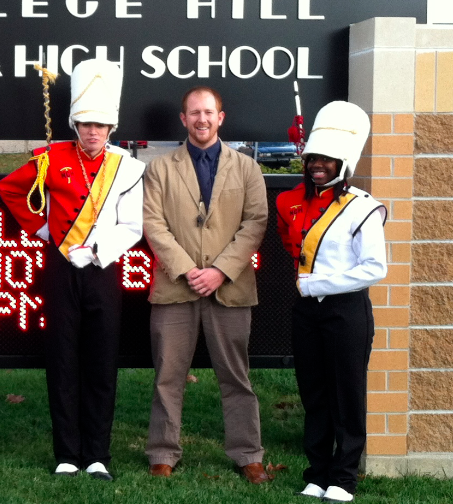Meet Devin Rodgers, Our New Norman Mealy Music Scholar

Even if you haven’t yet met Devin Rodgers on the CDSP campus, there’s a chance you may have heard him.
When Bishop Marc Andrus joined the CDSP community October 1 to bless the campus buildings and the ministries they support, Rodgers helped lead the parade.
“I played trumpet and we had a drummer,” he said. “We walked around campus singing and playing music between the places we were blessing. It was kind of cool.”
Rodgers is this year’s recipient of the Norman Mealy Music Scholarship, given to encourage skilled musicians with an interest in church music to attend and enrich the musical life of CDSP and the church at large. Rodgers is thrilled with the seminary and is grateful for the scholarship.
“I love it here,” he said. “It’s a great fit.”
Rodgers spent a year at Bexley Seabury before arriving at CDSP in September as a second year MDiv student, a move prompted when his husband, Philippe Terrasson, got a new job in California.
Church music has been an integral part of Rodgers’ life since he was a little boy attending the Lutheran church. In grade school he learned to play the clarinet and the trumpet, which is his primary instrument. He went on to major in music education at Miami University in Oxford, Ohio, where he was the principal chair of the symphony band and was trumpet section leader in the marching band. Following graduation, he taught instrumental music for four years to students in grades six through twelve in North College Hill, Ohio. While serving as a band director, “I began to see the ways music-making could be translated into service and community. How could this be translated into a formal church structure?”
At Bexley Seabury, Rodgers was in a brass choir and took piano lessons as an elective.
“As a musician, I recognize that there’s a spiritual aspect of music connecting with worship and prayer. Music, by its nature, is an expression of who we are. If we are created in the image of God, then music gives us a glimpse of God’s nature, particularly as creative and life-giving.”
The Norman Mealy scholarship is given in honor of Norman Mealy (1923–1987), who was professor of church music at CDSP from 1952 to 1987 and at the GTU from 1965 to 1987. He also served as the director of music at Saint Mark’s Episcopal Church in Berkeley from 1947 to 1961 and was ordained as an Episcopal priest in 1960.
Mealy was active in developing new music within the Episcopal Church and served on several commissions on service music and liturgy. The scholarship bearing his name requires proficiency in music leadership and helps to pay the tuition of recipient, who also serves as an assistant to George Emblom, the director of chapel music and CDSP’s assistant professor of church music.
At CDSP, liturgical and ritual music has long been considered an essential part of liturgy, and everyone is encouraged to develop their own musical skills and appreciation. Sixty years ago, a May 14, 1955, article in the Eugene, Oregon Register-Guard newspaper announced a 10-day summer school of church music at CDSP, run by Norman Mealy.
According to the article, “This school will provide the only intensive training in the music of the Episcopal Church that is available to church musicians west of the Rocky Mountains. It has been designed to offer training in the practical aspects of church music and to help musicians understand the profound relationship of music to the worship of the church.”
Rodgers understands that relationship.
“Music is so tied into our liturgical traditions. Our liturgy and scripture are full of images of music-making, both on earth and in heaven,” he said. “I particularly like Psalm 98, verse 6, which talks about praising God with the sounds of trumpets. When I was confirmed, each confirmand got to choose a favorite piece of scripture. That was the passage I chose.”
Rodgers became an Episcopalian in 2008, while he was in college.
“I went to an adult forum at Holy Trinity Church in Oxford, Ohio, to discuss how the church could be more supportive of the LGBT student community. I was so impressed that the parish was so supportive and receptive that I stayed for the Eucharist, and then I was kind of hooked.”
Rodgers said he looks forward to working with Emblom and exploring how sacred music can involve the use of a variety of instruments and music selections.
“One of the things I talked to George about is that, traditionally, we think of church musicians as selecting music for organs or pianos or choosing hymns. It was cool to talk to him about using other instruments and about music selection. As we strive to be the Episcopal Church in a more diverse society, I hope our musical tradition continues expanding and evolving to reflect the culture of the people, while also holding on to our traditional and rich music background.”
Whatever instrument or style is used, “music is one way that humans make theological connections and understandings,” Rodgers said. “As church leadership and musicians, it is our job to ensure that the liturgy and music is in the language of the people. It is my hope that our musical offerings would add a level of understanding and insight to the mission that we are called to in the world.”

